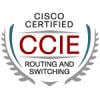Is it a bad idea to pursue the CCNP with only 1 year of networking experience?
Comments
-
 okplaya
Member Posts: 199
I always found it extremely strange that on a website dedicated to helping people get certifications, members tell other members not to get certifications. It is never a bad time/idea to educate yourself.
okplaya
Member Posts: 199
I always found it extremely strange that on a website dedicated to helping people get certifications, members tell other members not to get certifications. It is never a bad time/idea to educate yourself. -
 networker050184
Mod Posts: 11,962 Mod
When people tell other people not to get certifications they are trying to help them (whether they are right or not is a whole different story).
networker050184
Mod Posts: 11,962 Mod
When people tell other people not to get certifications they are trying to help them (whether they are right or not is a whole different story).
I agree educating yourself is never a bad thing, but going for a certification isn't always the best plan of action.An expert is a man who has made all the mistakes which can be made. -
 MrBishop
Member Posts: 229 ■■■□□□□□□□
Removing the certification factor and you still should be learning in this field! IT is an ever changing industry and the learning process never ends. I'm not saying go be a cert monkey but to stop yourself from becoming better and more knowledgeable about your profession is counterproductive and will only hurt your chances at getting promoted or getting a job.Degrees
MrBishop
Member Posts: 229 ■■■□□□□□□□
Removing the certification factor and you still should be learning in this field! IT is an ever changing industry and the learning process never ends. I'm not saying go be a cert monkey but to stop yourself from becoming better and more knowledgeable about your profession is counterproductive and will only hurt your chances at getting promoted or getting a job.Degrees
M.S. Internet Engineering | M.S. Information Assurance
B.S. Information Technology | A.A.S Information Technology
Certificaions
Currently pursuing: CCIE R&Sv5 -
 Danielh22185
Member Posts: 1,195 ■■■■□□□□□□
I kind of look at it this way: If you focus your time on CCNP studies you are learning and increasing your marketability two fold. I have never held a position where I didn't learn something new each day. If you aren't then you simply are not applying yourself. You are gaining valuable Juniper experience and learning new things on the job right now which is great. Also, you are gaining valuable knowledge through studying Cisco. Even though you do not have the real world experience with Cisco stuff primarily I believe CCNP is not just something you can open a book and take a test on. You really have to understand the technology in-depth. I think you are actually making yourself a lot more marketable by studying CCNP on top of continually building your experience with Juniper technology. When the time comes for you to look for something else and you have a CCNP + working Juniper experience. I think that will speak a lot more than just going the extra mile with Juniper. Don't get me wrong learning Juniper to a higher level or certifying in it wouldn't be a bad idea but I think immersing yourself into technology that dominate in the industry is a must.
Danielh22185
Member Posts: 1,195 ■■■■□□□□□□
I kind of look at it this way: If you focus your time on CCNP studies you are learning and increasing your marketability two fold. I have never held a position where I didn't learn something new each day. If you aren't then you simply are not applying yourself. You are gaining valuable Juniper experience and learning new things on the job right now which is great. Also, you are gaining valuable knowledge through studying Cisco. Even though you do not have the real world experience with Cisco stuff primarily I believe CCNP is not just something you can open a book and take a test on. You really have to understand the technology in-depth. I think you are actually making yourself a lot more marketable by studying CCNP on top of continually building your experience with Juniper technology. When the time comes for you to look for something else and you have a CCNP + working Juniper experience. I think that will speak a lot more than just going the extra mile with Juniper. Don't get me wrong learning Juniper to a higher level or certifying in it wouldn't be a bad idea but I think immersing yourself into technology that dominate in the industry is a must.
I am right there with you too. I have about a year experience, nothing in Juniper, but I barely even paused after getting my CCNA to jump into CCNP. I am casually studying right now as I am trying to finish of Sec+ real quick, but plan to go into it full on after Sec+ is out of the way.Currently Studying: IE Stuff...kinda...for now...
My ultimate career goal: To climb to the top of the computer network industry food chain.
"Winning means you're willing to go longer, work harder, and give more than anyone else." - Vince Lombardi -
 jamesp1983
Member Posts: 2,475 ■■■■□□□□□□
I don't think it is. A lot of people go for their CCNP without much real world experience."Check both the destination and return path when a route fails." "Switches create a network. Routers connect networks."
jamesp1983
Member Posts: 2,475 ■■■■□□□□□□
I don't think it is. A lot of people go for their CCNP without much real world experience."Check both the destination and return path when a route fails." "Switches create a network. Routers connect networks." -
 ChooseLife
Member Posts: 941 ■■■■■■■□□□
ChooseLife
Member Posts: 941 ■■■■■■■□□□
I agree 100% with this comment.networker050184 wrote: »When people tell other people not to get certifications they are trying to help them (whether they are right or not is a whole different story).
I agree educating yourself is never a bad thing, but going for a certification isn't always the best plan of action.“You don’t become great by trying to be great. You become great by wanting to do something, and then doing it so hard that you become great in the process.” (c) xkcd #896
GetCertified4Less - discounted vouchers for certs -
 YuckTheFankees
Member Posts: 1,281 ■■■■■□□□□□
Wow, thank you so much for all the advice and opinions. I have decided to continue onwards in the Cisco path once I finish my CCNA studies. The biggest thing I want is knowledge, but adding a few extra letters to my name doesn't hurt. I'm currently looking at equipment to build a nice home lab, enough with the simulators
YuckTheFankees
Member Posts: 1,281 ■■■■■□□□□□
Wow, thank you so much for all the advice and opinions. I have decided to continue onwards in the Cisco path once I finish my CCNA studies. The biggest thing I want is knowledge, but adding a few extra letters to my name doesn't hurt. I'm currently looking at equipment to build a nice home lab, enough with the simulators .
.
Once I decide to leave my current job, I'm hoping the certifications can get me past the HR filters and then I'll happily show the interviewer I know my stuff. -
 Carl_S_901
Member Posts: 105
I worked on Juniper M40 boxes a long time ago when the M40 was the best box Juniper had. At that time I was working daily on Cisco, Juniper, Unisphere, and Redback routers as well as Nortel ATM boxes and Lucent DSLAMs.
Carl_S_901
Member Posts: 105
I worked on Juniper M40 boxes a long time ago when the M40 was the best box Juniper had. At that time I was working daily on Cisco, Juniper, Unisphere, and Redback routers as well as Nortel ATM boxes and Lucent DSLAMs.
I do not know how much things have changed but the biggest thing I remember about the Juniper was:
1. It was an IP only box. Therefore, many of the Cisco commands worked on Juniper if you removed the ip from them.
Example:
show ip int brief = show int brief on Juniper
2. HSRP was VRRP on Junipers - config slightly different but pretty much the same thing
3. No EIGRRP, Cisco-HDLC, or any other Cisco proprietary protocols on the Juniper box for the obvious reason.
Other than that, I think Cisco knowledge would go a long way on Juniper platforms as well. However, others may feel free to correct me if I am wrong on this and things have changed significantly.
Thanks
Carl S.
Check out my personal certification journey blog
Carl's Certification Journey | The road to getting certified can often be bumpy -
 Carl_S_901
Member Posts: 105
Regarding the "is it good to get certs without experience" discussion:
Carl_S_901
Member Posts: 105
Regarding the "is it good to get certs without experience" discussion:
I was anti-cert for a very long time. I attended a lot of training in the past and never bothered to take certification tests behind them. My thought was "I know this stuff, my employer knows I know it, and I do not need to pay for a piece of paper that says I know it".
Big Mistake!
I definitely regret this stance now.
Part of this also came from meeting certified people on the job who couldn't DO stuff. They had the certs but didn't have the experience. However, guess what? The certs got them in the door and they did end up learning how to DO and got that experience.
So if someone gets a CCNP and has little real world experience, but it gets them in the door to learn then I say that is a good thing to have on your resume. Also, my opinion is put every cert you have on your resume.
Another big mistake I made was blowing off topics that weren't directly related to my current roles. For example, I would go to some training course and as a WAN-centric person I would say "I don't need to know all this LAN stuff because I am not going to use that on the job". Now, I try to be open to everything because you never know when you might need it in the future.
Bottom line:
Get certifications and experience. If you cannot get both then definitely get the certifications in the meantime.
Thanks
Carl S.
Check out my personal certification journey blog
Carl's Certification Journey | The road to getting certified can often be bumpy -
 MrXpert
Member Posts: 586 ■■■□□□□□□□
I second that. I have no real world experience with CISCO. The challenge drives me on.I'm an Xpert at nothing apart from remembering useless information that nobody else cares about.
MrXpert
Member Posts: 586 ■■■□□□□□□□
I second that. I have no real world experience with CISCO. The challenge drives me on.I'm an Xpert at nothing apart from remembering useless information that nobody else cares about.
